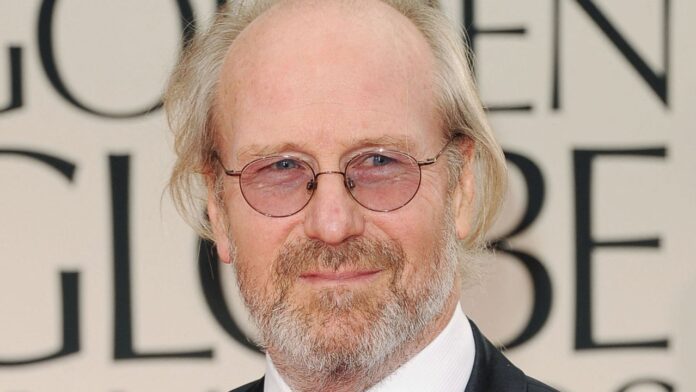William Hurt, whose laconic charm and self-assured nuance as an actor landed him roles in films like Broadcast News, Body Heat, and The Big Chill in the 1980s, has died. He was 71 years old at the time. Hurt died of natural causes on Sunday, according to Hurt’s son, Will. Hurt died quietly in the company of his family, according to his son. He died at his home in Portland, Oregon, according to The Hollywood Reporter. Hurt’s death was initially reported by Deadline. In 2018, Hurt was diagnosed with prostate cancer that had spread to his bones.
Hurt was nominated for an Academy Award four times throughout his long career, winning for Kiss of the Spider Woman in 1985. Hurt swiftly established himself as a mainstay of the 1980s with his debut in Paddy Chayefsky’s Altered States as a psychopathologist investigating schizophrenia and experimenting with sensory deprivation.
Hurt co-starred with Kathleen Turner as a lawyer enticed into murder in Lawrence Kasdan’s 1981 sensual neo-noir Body Heat. Hurt co-starred with Kasdan in The Big Chill, in which he played Nick Carlton, a moody Vietnam War veteran who is one of a group of college mates who meet for their friend’s burial.
Hurt, whose father worked for the State Department, was born in Washington, D.C., and spent his childhood at a boarding school in Massachusetts, where he travelled extensively. When he was a child, his parents divorced. Hurt’s mother married Henry Luce III, the son of Time magazine founder Henry Luce when he was ten years old. Hurt studied acting at Julliard and made his theatrical debut with the Circle Repertory Company in New York. Following The Big Chill, he returned to Broadway to act in David Rabe’s Hurlyburly, for which he received a Tony nomination.
His co-star, Marlee Matlin, won an Academy Award for her role as a custodian at a deaf school in 1986’s Children of a Lesser God. Hurt portrayed a speech pathologist. Hurt and Matlin’s romance took place off-screen as well, but it wasn’t Hurt’s first time having his personal life exposed.
From 1971 to 1982, Hurt was married to actress Mary Beth Hurt (also a Big Chill co-star). Hurt had a relationship with Sandra Jennings while still married to Mary Beth Hurt, and their son was the catalyst for Hurt’s divorce from Mary Beth Hurt. Six years later, Jennings filed a high-profile court action claiming she was Hurt’s common-law wife under South Carolina law and so entitled to a part of his earnings. Although a New York judge found in Hurt’s favour, the actor’s relationship with fame remained tense.
Hurt told The New York Times in 1983, “Acting is a very intimate and private activity.” “Acting, like writing, necessitates a great deal of isolation. Yes, you will encounter other people, but you will also be required to master a trade and technique. It’s a job. There’s this strange thing about my acting being perceived as a clamour for attention to my person as if I needed so much love or attention that I’d give up my right to privacy.”
Matlin documented physical and mental abuse during their relationship in her 2009 biography. Hurt apologised at the time of publication, stating, “My personal recollection is that we both apologised and did a great deal to mend our lives.”
Hurt also suffered from drug and alcohol addiction during this time and went to treatment centres. He also earned a reputation for not always being a cooperative partner. He was dubbed “notoriously volatile” by the New Yorker. Hurt married Heidi Henderson, whom he met in treatment, in 1989. They have two children as a couple. Hurt also had a daughter with Sandrine Bonnaire, a French actress and filmmaker whom he met while filming the direct-to-video Albert Camus adaption The Plague in 1992.
Hurt played a polished but lightweight anchorman in James L. Brooks’ 1987 comedy Broadcast News, which reflected the developing marriage of entertainment and journalism.
Hurt’s Broadcast News co-star Albert Brooks was among the many who paid tribute to Hurt after his death on Sunday. Brooks remarked on Twitter, “So sad to hear this news.” “It was a dream come true to work with him on ‘Broadcast News.’ He will be missed a lot.”
Hurt fell out of favour with filmmakers in the 1990s after a successful run in the 1980s, and some speculated that it was due to his bad image. Hurt, on the other hand, maintained his position, telling the Los Angeles Times in 1994, “I provide more by solving the reality than by catering to expectations and naïve dreams.”
Hurt has stated that his famed 1980s run was more of an aberration than what distinguished him as an actor.
In 2004, he told The Telegraph, “Success is alienating.” “The Oscar was certainly alienating. In some respects, it was the polar opposite of what I was going for. I didn’t want to be alone, so I avoided it. ‘He’s an Oscar winner, he’s the one to be,’ I didn’t want some huge bullseye on my chest screaming. I wanted to be an actress, therefore I was perplexed by the situation. I’m still perplexed by it at times.”













